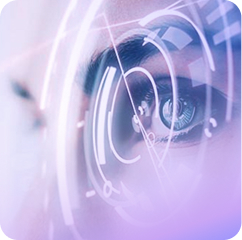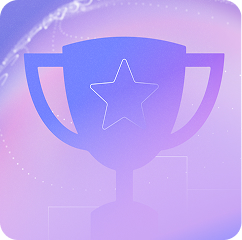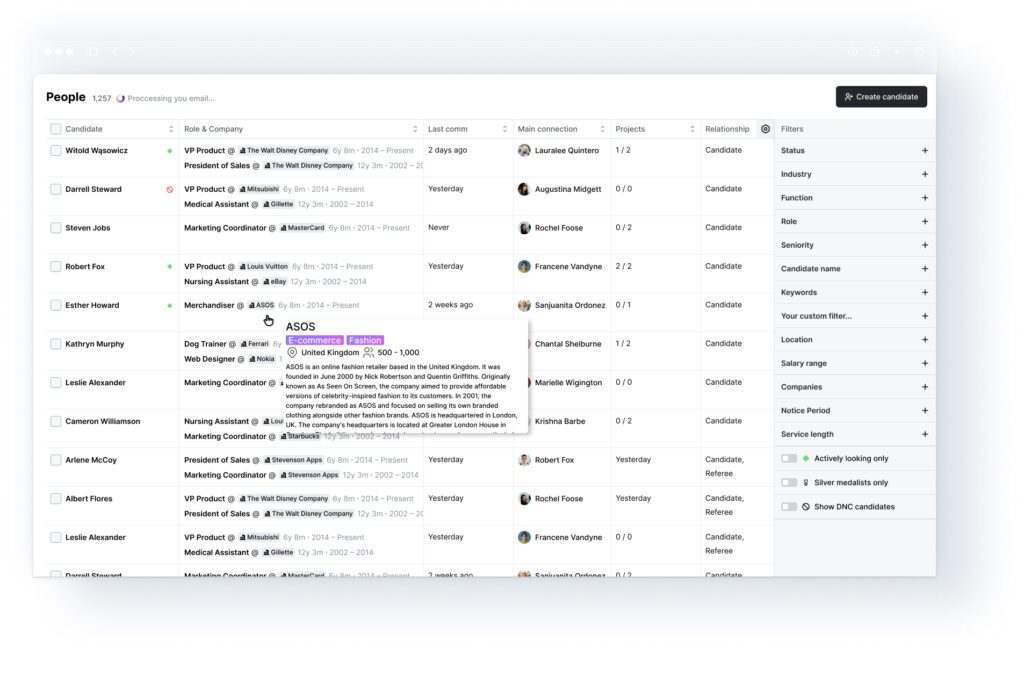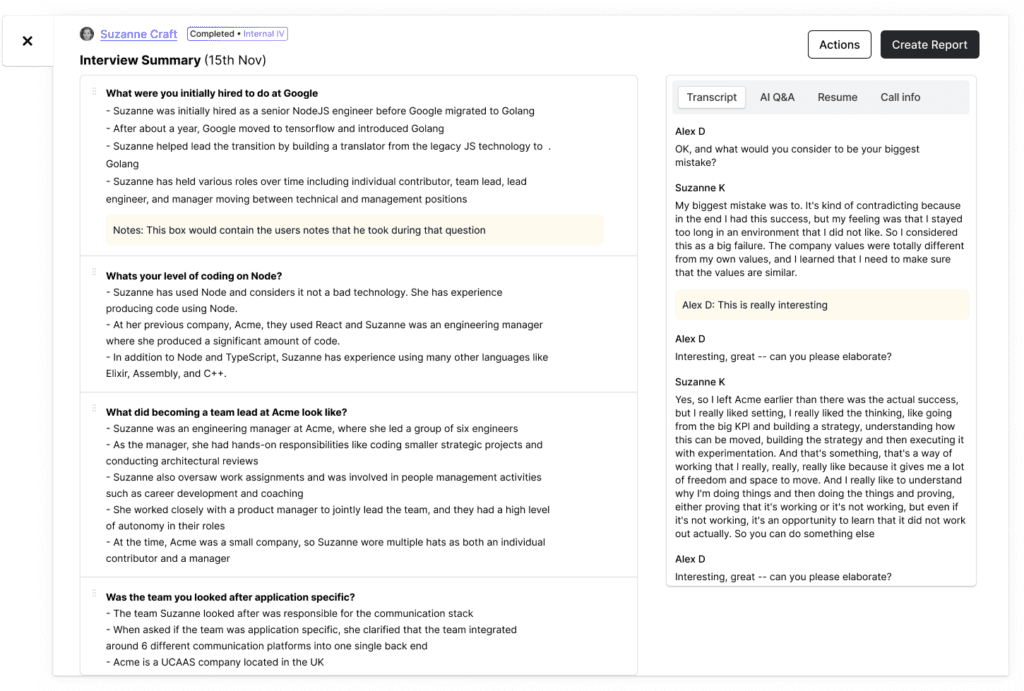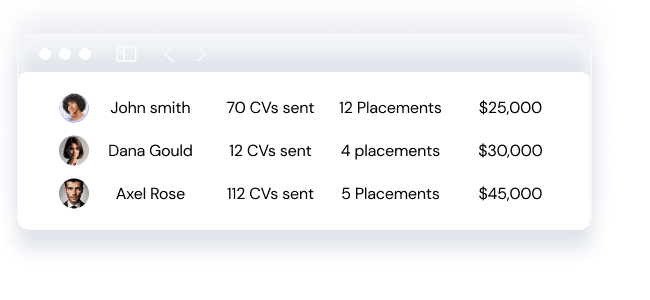
// Executive Search Best Practices, Glossary
AI in Recruitment: Key Terms and Use Cases You Need to Know
08/07/2024
7 MIN
Whether you are a seasoned, ‘AI-powered’ recruiter or just starting your journey into AI-driven recruitment, this comprehensive list is your go-to guide for navigating the AI landscape with confidence. Deepen your understanding of AI in recruitment, familiarise yourself with basic terminology, and find out the pivotal applications that are shaping the future of recruitment.
AI in Recruitment: Defining Key Concepts and Use Cases
Candidate Experience (CX)
CX in recruitment refers to the overall experience and interactions that candidates have with a company throughout the recruitment process, including application, communication, interviews, and onboarding.
📋Use Case of AI in Enhancing Candidate Experience
AI plays a crucial role in optimising and personalising candidate experiences.
Through natural language processing (NLP) algorithms, AI-powered chatbots can have personalised conversations with candidates.
They can serve as helpful assistants, quickly answering questions, giving updates on job applications, and suggesting what to do next.
By automating routine tasks and offering round-the-clock support, AI enhances the overall candidate experience, fostering a positive impression of the organisation and improving the likelihood of attracting and retaining top talent.
⬆️ Back to top
Candidate Matching
This refers to the process of identifying and assessing job candidates who best fit the requirements and qualifications of a particular job role. It involves comparing the skills, experience, qualifications, and other relevant attributes of candidates against the job requirements to determine their suitability for the position.
Candidate matching can be performed manually by recruiters or automated using technology, such as applicant tracking systems (ATS) or AI-powered algorithms.
📋Use Case for AI to Optimise Candidate Matching
By leveraging natural language processing (NLP) and machine learning techniques, AI systems can accurately match candidates’ skills, experiences, and qualifications with the requirements of job descriptions. Moreover, AI algorithms continuously learn and adapt from historical data, improving their matching accuracy over time.
⬆️ Back to top
Candidate Relationship Management (CRM)
Refers to the strategic approach and technology platforms used by recruiters to build and maintain relationships with potential candidates, both active and passive, throughout the recruitment process.
CRM platforms typically include features such as candidate databases, communication tools (email, messaging), automated workflows, and analytics to track interactions and measure engagement.
The goal of CRM in recruitment is to create a talent pipeline of qualified candidates, cultivate long-term relationships, and ensure a positive candidate experience, even if a candidate is not immediately selected for a job opportunity. This proactive approach helps recruiters attract top talent, reduce time-to-fill, and improve overall recruitment outcomes.
📋 Use Case of AI in Candidate Relationship Management (CRM)
AI-powered CRM platforms can automate routine tasks such as candidate outreach, follow-ups, and scheduling, allowing recruiters to focus on building meaningful connections with candidates. Moreover, it can provide insights into candidate preferences, behaviours, and interests, enabling you to tailor your communication strategies accordingly.
💡 Unlike outdated systems that require endless data tagging, Atlas’s AI-powered ATS solution takes care of the entire process seamlessly.
Featuring innovative capabilities such as email and resume sync, as well as comprehensive company and candidate enrichment, our platform can enhance your search experience and make your candidate database more valuable.
⬆️ Back to top
Chatbots
Chatbots in recruitment are automated conversational agents powered by AI technologies. Serving as virtual assistants, they can engage with job seekers and candidates through messaging platforms or websites, providing information, answering queries, and even conducting preliminary screening interviews.
📋Use Case of AI Chatbots in Recruitment
In recruitment, AI chatbots can connect with candidates in real time, answering questions, scheduling interviews, and providing updates throughout the hiring process, enhancing candidate experience and efficiency. They can pre-screen candidates, schedule interviews, and provide personalised feedback, saving you valuable time and resources.
⬆️ Back to top
Contract Management
Refers to the process of overseeing and administering contracts or agreements between an organisation and various stakeholders involved in the recruitment process.
This includes contracts with recruitment agencies, job boards, background check providers, and other vendors or service providers. It involves tasks such as drafting contracts, negotiating terms and conditions, ensuring compliance with legal and regulatory requirements, tracking contract milestones and deadlines, and managing contract renewals and terminations.
📋Use Case of AI in Contract Management Automation
AI-powered contract management systems can automate various aspects of contract administration, from contract drafting and negotiation to contract analysis and compliance monitoring.
These systems can analyse contract language, extract key terms and
clauses, and generate contracts or contract templates based on predefined criteria, reducing manual effort and time spent on repetitive tasks.
AI tools can also assist you in the contract review process by flagging potential risks, inconsistencies, and deviations from standard terms, enabling legal teams to focus on high-value activities.
Experience the convenience firsthand as our platform automates document collection, crafts engaging emails, and ensures prompt submission and approval of timesheets.
Enjoy features like AI document scanning, simplified timesheet management, AI-driven email drafting, and seamless integration with your accounting and billing systems.
⬆️ Back to top
Decision Support Systems (DSS)
Decision Support Systems (DSS) in recruitment are technology-based tools and platforms designed to assist recruiters and hiring managers in making informed decisions throughout the hiring process.
📋Use Case of AI-Powered DSS in Recruitment
An AI-powered DSS provides you with data-driven insights, facilitating informed decision-making throughout the recruitment process.
These systems leverage data analytics, predictive modelling, AI algorithms, and
other advanced technologies to analyse and interpret large volumes of data related to candidates, job requirements, and organisational needs.
By incorporating machine learning and predictive modelling, an AI-powered DSS can accurately forecast candidate suitability, identify top talent, and predict job fit.
⬆️ Back to top
Interview Scheduling
Refers to the process of arranging and coordinating interviews between candidates and hiring managers/teams. It involves finding mutually convenient times for both parties, considering factors such as availability, time zones, and preferences. Interview scheduling typically begins once a pool of candidates has been identified and shortlisted for further evaluation.
Recruiters or hiring managers reach out to candidates to propose potential interview dates and times, often using email or specialised scheduling software. Effective interview scheduling ensures that the recruitment process progresses smoothly and that all stakeholders can participate in candidate evaluations without scheduling conflicts.
📋 Use Case of AI Interview Scheduling Tools
AI-powered interview scheduling tools automate and streamline the often time-consuming and complex process of arranging interviews in recruitment.
These tools leverage AI algorithms to analyse the availability, preferences, and time zones of both candidates and
interviewers, optimising scheduling efficiency and minimising scheduling conflicts.
Moreover, they can handle rescheduling requests, send automated reminders to participants, and integrate seamlessly with calendar systems, reducing the administrative burden on you and ensuring smooth coordination of interviews.
⬆️ Back to top
Interview Note-Taking
Interview note-taking is the practice of documenting observations, feedback, and impressions gathered during candidate interviews. It involves recording key information such as candidate responses to interview questions, relevant qualifications, skills, strengths, weaknesses, and overall fit for the job role.
Recruiters and hiring managers typically take notes during or immediately after interviews, using a structured format or template to capture relevant details efficiently. These notes may be shared with other members of the hiring team to facilitate collaboration and consensus-building during the candidate evaluation process.
📋Use Case of AI Interview Intelligence and Note-Taking
AI can analyse audio recordings or transcripts of candidate interviews and automatically generate detailed notes summarising key points, insights, and observations.
AI-generated interview notes significantly reduce the time and effort required for manual note-taking, allowing you to
Focus more on engaging with candidates and evaluating their qualifications.
It can also improve consistency and objectivity in candidate evaluations by standardising the documentation process.
Furthermore, these notes can be easily shared and accessed by members of the hiring team, facilitating collaboration and decision-making.
💡 Experience the convenience of our AI Interview Notes feature, which automates note generation for every call and interview, freeing you to focus on client conversations and candidate interactions.
- Simply invite Atlas to intake meetings or interviews, and receive comprehensive notes directly within the platform.
- With Atlas AI, you can query specific interviews or review every word from a candidate.
- Access full transcripts of each conversation, ready for replay and review at your convenience.
- Customise your notes to your preference—whether it’s highlighting key details or focusing on specific outcomes—by instructing Atlas to create custom templates tailored to your needs.
⬆️ Back to top
Job Posting Optimization
Refers to the process of refining and improving job postings to attract the right candidates and maximise the effectiveness of recruitment efforts.
It involves crafting job descriptions that accurately reflect the requirements, responsibilities, and expectations of the role while also appealing to potential candidates.
Optimization strategies may include using relevant keywords to improve visibility in online job searches, incorporating compelling language to attract candidates, and ensuring the posting is formatted for readability and engagement. It may also involve targeting specific demographics or industries through tailored messaging and distribution channels
📋Use Case of AI-Driven Job Posting Optimisation Tools
AI can analyse large datasets to identify trends, patterns, and preferences in job postings and candidate responses. This enables you to tailor job descriptions with relevant keywords, language, and formatting to better attract and engage potential candidates.
AI can also provide insights into market demand, competitor strategies, and candidate demographics, informing decisions on targeting and distribution channels.
Using AI tools can optimise your job posting strategies for maximum visibility, reach, and candidate engagement across online platforms and job boards.
⬆️ Back to top
Job Description Writing
Refers to the process of creating detailed and accurate documents that outline the responsibilities, qualifications, and expectations of a particular job role within an organisation.
These descriptions serve as a key communication tool between recruiters and potential candidates, providing essential information to help candidates assess their suitability and interest in the position.
Effective job description writing involves clearly defining the role’s objectives and requirements while using language that is concise, inclusive, and appealing to potential candidates. Well-written job descriptions are essential for attracting qualified candidates, setting expectations, and guiding the recruitment process effectively.
📋 Use Case of Leveraging AI In Job Description Writing
AI tools can generate tailored job descriptions that accurately reflect the requirements and expectations of the role. They do this by analysing vast amounts of data from job postings, candidate profiles, and industry trends.
They can suggest relevant keywords, phrases, and language to optimise job descriptions for visibility in online searches and to attract the right candidates.
AI-driven tools can also provide real-time feedback and insights, enabling you to continuously refine and improve job descriptions based on performance metrics and candidate feedback.
⬆️ Back to top
Machine Learning
Machine learning in recruitment refers to the application of AI techniques that enable systems to learn from data and make predictions or decisions without being explicitly programmed.
📋 Use Case of Machine Learning in Recruitment
Machine learning algorithms can be used for various tasks in recruitment, such as resume parsing, candidate matching, predicting candidate success, identifying bias in hiring practices, and automating routine tasks like interview scheduling and note-taking.
It can analyse large datasets of candidate information, job descriptions, resumes, and hiring outcomes to identify patterns and insights that help improve the recruitment process.
⬆️ Back to top
Natural Language Processing (NLP)
Refers to the application of AI techniques to analyse, understand, and generate human language data within the context of the hiring process. NLP enables systems to interpret and process unstructured text data from various sources, such as resumes, job descriptions, emails, and social media profiles.
📋Use Case of NLP in Recruitment
NLP algorithms can be used for tasks such as resume parsing, sentiment analysis of candidate communications, chatbot interactions, and job description optimization. By leveraging NLP, you can automate manual tasks, extract relevant information from text documents, identify key skills and qualifications, and improve candidate engagement through personalised communication.
⬆️ Back to top
Predictive Analytics
Refers to the use of data analysis techniques and statistical algorithms to forecast future hiring outcomes and trends based on historical data. By analysing patterns and relationships within recruitment data, predictive analytics aims to identify potential candidates, predict their likelihood of success or fit for a particular role, and anticipate future talent needs.
This approach involves analysing various data points, such as candidate qualifications, skills, experience, performance metrics, and hiring outcomes, to develop predictive models that can inform recruitment strategies and decision-making.
📋Use Case of AI-Powered Predictive Analytics
Using advanced algorithms and machine learning techniques, AI can analyse historical hiring data, candidate profiles, and market trends to forecast future talent needs and trends.
Using advanced algorithms and machine learning techniques, AI can analyse historical hiring data, candidate profiles,
and market trends to forecast future talent needs and trends.
These predictive models can enable you to proactively identify and address potential talent gaps and optimise recruitment strategies.
AI-powered predictive analytics can also assist in candidate sourcing and screening by identifying high-potential candidates and predicting their likelihood of success in specific roles
⬆️ Back to top
Passive Candidate Sourcing
Refers to the process of identifying and attracting individuals who are not actively seeking new job opportunities but possess desirable skills, experiences, and qualifications that match the requirements of a particular role.
Unlike active candidates who are actively searching for job openings and applying to positions, passive candidates are typically already employed and may not be actively looking to change jobs. However, they may be open to considering new opportunities if presented with the right offer.
Passive candidate sourcing involves various strategies, such as leveraging professional networking platforms, social media, talent databases, and referrals to identify potential candidates who may not be visible through traditional job postings.
📋Use Case of AI in Passive Candidate Sourcing
AI tools can identify potential passive candidates by analysing large datasets from professional networking platforms, social media, and other sources.
This can give you access to a broader pool of qualified candidates and help
you identify high-quality candidates who may not be actively searching for job opportunities.
They can also personalise outreach messages and recommendations based on candidate profiles and preferences, increasing the likelihood of attracting their interest.
⬆️ Back to top
Recruitment Analytics
Refers to the process of using data analysis and insights to measure, evaluate, and optimise various aspects of the recruitment process.
This includes collecting and analysing data related to candidate sourcing, applicant tracking, hiring outcomes, time-to-fill, cost-per-hire, retention rates, and other key performance indicators (KPIs) to gain valuable insights into recruitment effectiveness and efficiency.
Recruitment analytics involves leveraging data visualisation, reporting tools, and predictive modelling techniques to identify trends, patterns, and areas for improvement in talent acquisition strategies.
📋Use Case of AI-Driven Recruitment Analytics
AI-driven recruitment analytics can provide valuable insights into candidate sourcing channels, hiring funnel performance, candidate quality, time-to-fill metrics, and more. With these insights, you can make decisions based on data, use your resources wisely, and find ways to improve your recruitment processes.
💡 If you want to get instant visibility into every facet of your organisation, Atlas Analytics provides a user-friendly, robust, and customizable suite of analytics features. From high-level overviews to detailed insights, you can use a range of analytics options tailored to your needs.
⬆️ Back to top
Resume Parsing
Is a process where the software automatically extracts and categorises key information from resumes, like work experience, education, skills, and contact details. This way, recruiters can easily search, filter, and manage a large number of resumes without spending hours manually sorting through them.
📋Use Case of AI Resume Parsing
AI systems can swiftly sift through large volumes of resumes, identifying key details such as work experience, skills, education, and qualifications. This speeds up the screening process and makes sure candidate evaluations are more accurate and consistent.
Moreover, AI resume parsing enables you to uncover hidden talents and diverse candidates by identifying relevant skills and experiences that might have been overlooked through traditional methods.
By automating mundane tasks associated with resume screening, you can save time and focus your efforts on enhancing the quality of selection and engaging with top candidates.
⬆️ Back to top
Report Generation
Refers to the process of creating comprehensive documents or summaries that provide insights and analytics related to various aspects of the hiring process. These reports typically include data on recruitment metrics such as candidate sourcing channels, application funnel analysis, time-to-fill, cost-per-hire, candidate demographics, and more.
Report generation allows recruiters to track and evaluate the effectiveness of their recruitment strategies, identify areas for improvement, and make data-driven decisions. They can be generated manually using spreadsheets and data analysis tools, or automatically through specialised recruitment software platforms that aggregate and analyse recruitment data.
📋Use Case of AI-Driven Automated Report Generation
AI-driven report generation enables you to effortlessly compile and analyse data about candidate sourcing, application analytics, hiring metrics, and workforce demographics. Based on real-time, data-driven intelligence, these AI systems can save you significant time and resources, and empower you to make informed decisions quicker.
⬆️ Back to top
Skills Assessment
Refers to the process of evaluating a candidate’s proficiency and competence in specific skills relevant to a job role.
Skills assessment can take various forms, including written tests, practical exercises, technical interviews, behavioural assessments, and simulated tasks. The assessment may cover a wide range of skills such as technical expertise, problem-solving abilities, communication skills, teamwork, leadership qualities, and domain knowledge.
It helps in identifying areas where candidates may need further training or development, informing decisions on hiring, training, and talent management strategies.
📋Use Case of AI-Driven Skills Assessment
AI-driven skills assessment can take diverse forms, including automated coding challenges, language proficiency tests, video interviews with natural language processing capabilities, and gamified simulations to evaluate problem-solving skills.
These assessments not only provide insights into candidates’ technical
competencies but also assess their soft skills, such as communication, adaptability, and teamwork.
Moreover, AI recruitment platforms with skills assessment features can adapt and personalise assessments based on candidate responses, ensuring a tailored evaluation experience that accurately reflects each candidate’s capabilities.
⬆️ Back to top
Talent and Interview Scoring
Is a method used by recruiters to evaluate and rank candidates based on their suitability for a particular role or position.
This process involves assigning numerical or qualitative scores to candidates based on various criteria such as skills, experience, education, cultural fit, and potential for success within the organisation.
Talent scoring helps to objectively assess candidates and prioritise them according to their alignment with the job requirements and company values. While scoring can be done manually, recruiters are increasingly turning to technology, such as AI-powered CRM, to automate and streamline the talent scoring process.
📋 Use Case of AI-Based Talent and Interview Scoring
AI-based talent and interview scoring systems analyse various data points, including resumes, cover letters, assessment results, and interview responses, to generate objective and consistent scores for each candidate. These scores are based on predefined criteria and can be customised to align with the specific requirements of each job role.
AI-based talent and interview scoring systems analyse various data points, including resumes, cover letters, assessment results, and interview responses, to generate objective and consistent scores for each candidate.
These scores are based on predefined criteria and can be customised to align with the specific requirements of each job role.
By leveraging AI tools capable of gathering and analysing extensive candidate data over time, you can track and monitor metrics such as candidate performance, hiring outcomes, and employee success rates.
This enables you to refine your scoring models continuously, enhancing the accuracy of your candidate assessments. Additionally, it also helps in overcoming biases inherent in manual evaluation processes, thereby ensuring fairness and equity in candidate assessment.
⬆️ Back to top
Final Thoughts: Understand the Transformative Power of AI in Recruitment
We hope that this glossary and exploration of key use cases have shed light on some of the fundamental concepts surrounding AI in recruitment. While we have covered many essential concepts, keep in mind that this is a dynamic list, constantly evolving alongside the ever-changing landscape of AI in recruitment.
By exploring these terminologies and applications, our goal is to deepen your understanding of the transformative potential that AI holds for you as a modern recruiter. By embracing the opportunities that AI presents and leveraging its capabilities, you can enhance your recruitment strategies and stay ahead in the competitive recruitment industry.

